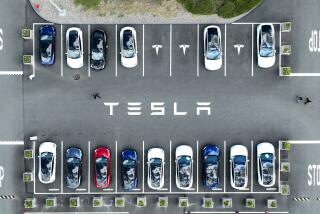More Malls, Fewer Dealers Seen for Auto Industry
- Share via
New car buyers of the future may find shopping for wheels a little like pricing television sets or refrigerators--perhaps browsing through huge auto malls that carry a wide array of models--and there will be dramatically fewer dealers selling cars, according to J. D. Power & Associates, an automobile marketing information company.
The Power study also measured customer satisfaction with automobile dealerships, revealing that domestic manufacturers outpaced European and Asian car makers.
The diminishing difference in product quality among manufacturers will mean that the treatment of customers and innovative approaches to the traditional dealership will become more important, said John J. Ferron, a partner at the Agoura Hills firm. At the same time, rising costs, falling profits and increasing competition will cause many dealers to close their doors.
“It’s a less forgiving business,” Ferron said.
Consolidation Trend
The J. D. Power study predicted a net reduction of 1,500 to 2,000 car dealerships in the next 18 months--a time when many Asian manufacturers plan to add retail outlets.
By 1995, the study said, the number of dealership owners will drop to 12,000 from the current 16,300 and the number of retail outlets will fall to 20,000 from 25,000. The year 2,000 will see 8,000 dealer owners with 18,000 outlets.
The consolidation trend began shortly after World War II, Ferron noted, when 47,500 dealers sold cars and most of those were single franchise operations.
“It’s not a battle between good dealers and bad dealers any more, it’s between good dealers and nearly good dealers,” Ferron said.
Many car dealers are losing money, he said. “I look at the red ink as a volcano. It’s a symptom of the plate movement in the industry and the thing driving the plate movement . . . is the customer.”
Marketing Experiments
To respond, more and more dealers will become “megadealers” offering several makes of car. Some will band together into auto malls--a trend already seen in Southern California, Ferron said. Some will separate their various businesses--new and used car sales, service, parts, leasing, body work and insurance--into different locations.
“We see a lot of experimentation in the marketplace,” he said. “The dealer as we know it is gradually being replaced by something different.
“People will still sell vehicles to people but as quality improves and as the dealer economics deteriorate, there are going to be mass marketing experiments.”
A survey of more than 25,000 car owners found that the highest sales satisfaction belonged to Mercedes-Benz, followed by Cadillac. Buick and Porsche tied for third while Lincoln and Mercury tied for fourth. J. D. Power didn’t reveal which types of dealers ranked at the bottom of the list of 35.
European manufacturers showed some improvement but domestic manufacturers continued to hold an advantage in customer sales satisfaction, Ferron said. Asian manufacturers rolled in third.
More to Read
Inside the business of entertainment
The Wide Shot brings you news, analysis and insights on everything from streaming wars to production — and what it all means for the future.
You may occasionally receive promotional content from the Los Angeles Times.










